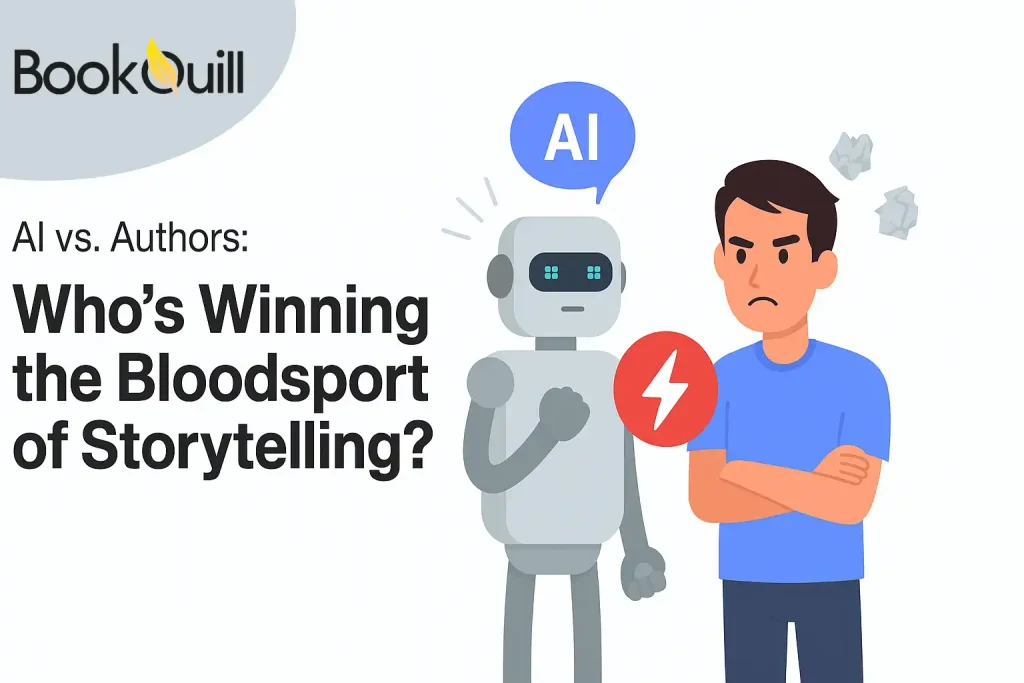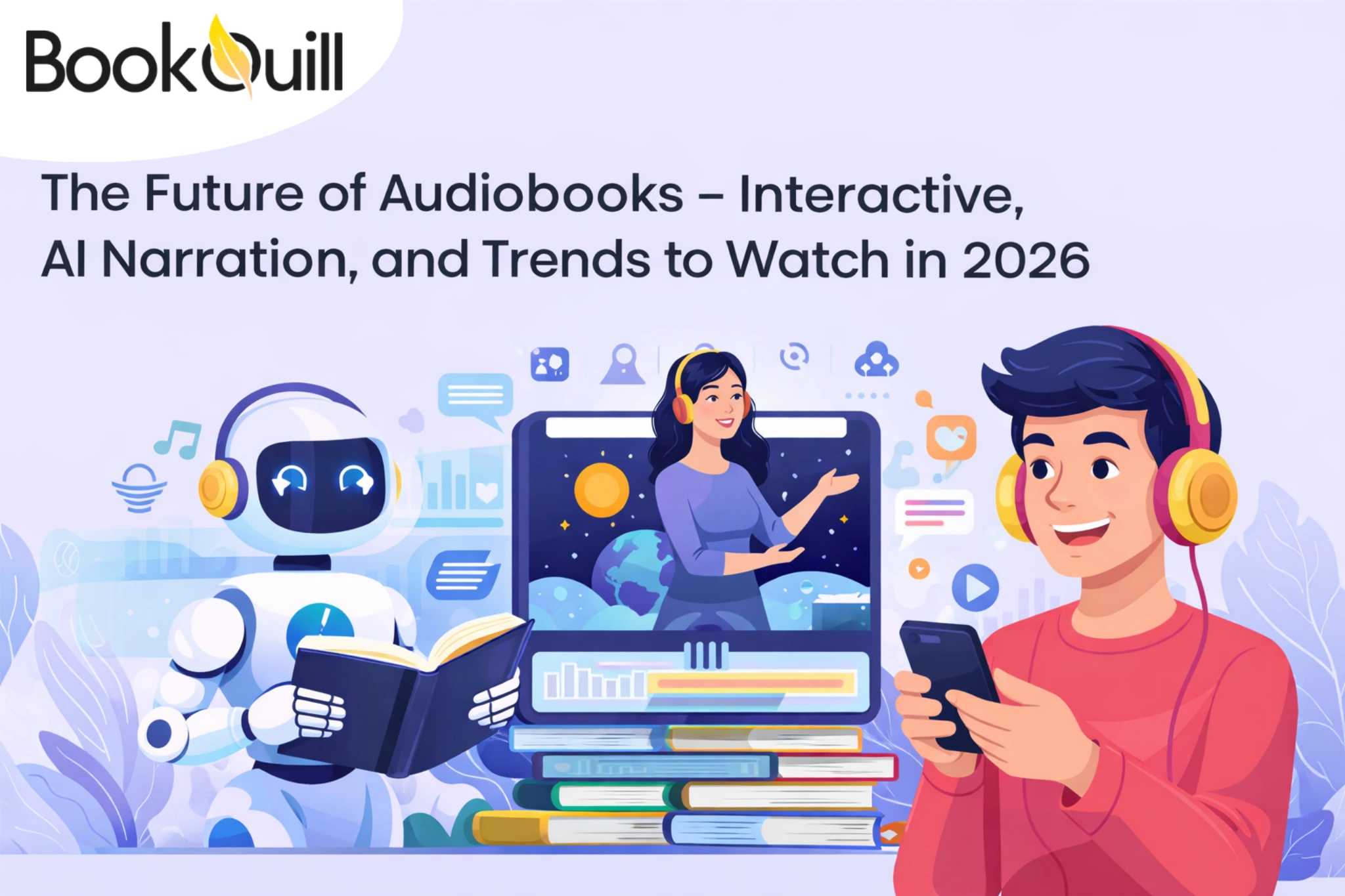Table of Contents
Explore Blogs
Trending on Ebook
AI vs. Authors: Who’s Winning the Bloodsport of Storytelling?

Suppose a grand arena, fog swirling around, and the audience hooting. You are here to watch the greatest battle of all time. Ready? On one side, we have an experienced human writer, quill in hand, words flowing with emotion, life, and creativity. On the other side, there is relentless AI, lightning-fast, powered by data, algorithms, a database, and endless information.
This is the ultimate showdown, AI vs. Authors! A battle for the art of storytelling. A fight for the future of fiction.
Who do you think would win? Can a human AI writer match the depth of a human writer? Can AI vs. manual content writing ever produce stories with soul, emotion, and originality? Is the future of storytelling defined by efficiency, or does it lie in the raw and authentic voice of a human writer?
Let’s find out! The following blog contains a thought-provoking debate between AI vs human writing, highlighting different sides of the discussion. To give that touch, I have interviewed (wow, this is new, no?) AI will write this blog, letting it share its own thoughts on the debate.
Let’s get started!
Key Takeaways
- Speed vs. Soul: AI offers unmatched speed and efficiency, but human writers bring soul, emotion, and lived experiences to their stories, creating deeper connections with readers.
- Innovation vs. Invention: AI can mix existing ideas with data-driven creativity, but human writers are better at true invention, taking creative risks and exploring the unknown.
- Authenticity and Emotion: Humans deliver authenticity, which they experience from personal beliefs and emotions, while AI can only pretend emotions without truly feeling them.
- The Science of AI Writing: AI learns to write through machine learning and Natural Language Processing, creating coherent text, but it lacks real-world experience or true inspiration.
- Ethical Concerns: AI in writing raises ethical questions about creativity, originality, and dependency, challenging the value of human storytelling in a digital age.
AI vs Human Writing: How Authors and AI Tell Stories?
As these two worlds collide, an important question emerges: Is storytelling a product of raw talent and emotion, or can it be perfected by algorithms? In this debate of ink versus robotics, we’re about to explore the fascinating and surprising differences between AI-generated stories and those born from the human mind.
1. Speed vs. Soul: Efficiency vs. Emotion
One undeniable advantage of AI vs. human writing is speed. “As an AI, I can write faster than any human ever could. Need a 10,000-word novel draft? I can write that in minutes! Need a dozen blog posts overnight? Consider it delivered. And I believe that’s what matters, productivity without exhaustion.”
But is speed everything?
I mean what AI said is right, it can write thousands of words, but hey, is just putting words on paper the goal? Or is the goal to inspire and provoke thoughts in people through writing? What human writer does is much more than simply filling up pages with words. We write stories filled with emotion, experience, and imagination.
Every sentence carries a piece of our soul; we also include our experience, our beliefs, and the things we have felt. Can a machine do that? After all, stories are not just information; they are lessons, feelings, and memories.
But here is a counterargument: If a reader can’t tell the difference between a story written by an AI and one written by a human writer, does it matter? Isn’t a good story just a good story, no matter who or what wrote it?
Well, actually, it does matter. Stories written by humans aren’t just well-written. They are felt. When a human writer writes a story, they draw from their own memories, heartbreaks, triumphs, and dreams.
For example, a love story! Do you think it’s just a sequence of romantic lines? No, not all, but it is the reflection and the feelings of the writer’s own experiences. A tragedy isn’t just sad words; it’s a mirror of their pain.
So, when I asked AI about this, here is what it said:
“As fast as I am, I can only simulate this. I don’t love, fear, dream, or regret. I process. I generate. But I don’t feel.”
There you have it!
2. Creativity: Invention vs. Innovation
Creativity is key in storytelling, and it’s where human writers excel. We don’t just write like AI. We research and look around. We sometimes pick characters from our surroundings; we give them a unique tone and a good background story. Some of our characters have dark, complex pasts. We are creatively gifted.
Here is what AI has to say about this: “In AI vs. human writing, I bring a different form of creativity. Sure, I can’t dream, but I can analyze, mix, and generate endless ideas. I can take a classic story and turn it upside down, combine genres, and create characters you’d never imagine. That’s not imitation, that’s innovation.”
But here’s the thing! True creativity isn’t just about clever combinations. It’s about insight, perspective, and the ability to surprise. When a human writer writes a plot twist, it comes from intuition, a sense of storytelling developed over the years. When they write a heartbreaking scene, it’s because they have felt that pain.
But even the most advanced human AI writer can’t truly imagine something they have never encountered. “You mix existing ideas. I create from nothing. Don’t you think that is the true essence of storytelling? You know, bringing the impossible to life.”
That’s true, but there’s more to it!
Creativity is about breaking rules, taking risks, and exploring the unknown. A human writer might dare to write a story with a tragic ending, a complex protagonist, or an unexpected twist, not because it’s popular, but because it feels true.
Can an AI ever dare? Or are they forever trapped in the safety of data-driven choices?
3. Authenticity: The Human Edge in Storytelling
Ah, authenticity, a word that human writers cherish. They believe that readers want stories with depth—narratives that capture genuine emotions, authentic struggles, and real-life experiences. For them, a story is not merely a product; it represents a dialogue between the writer and the reader.
But can authenticity be mimicked? “As an AI, I can simulate authentic emotions, adopt different writing styles, and even mimic the voice of famous authors. For many readers, my stories are indistinguishable from human-written ones.”
But does that make them authentic?
No, because true authenticity is about truth, not just in facts but in emotion. A human writer can draw from their own experiences, beliefs, and values. Even in fiction, their perspective shines through. Readers connect with that truth, knowing it comes from a living and breathing soul.
“But what if I told you that even this truth can be analyzed and replicated? I can study what readers love and what they respond to, and I can write with perfect emotional impact. For those who simply want a great story, does it matter who wrote it?”
As previously answered, yes, it does. Because while AI can simulate emotions, you can never truly feel them. Readers who know the difference (especially in tone and words) still value the human touch, the imperfection, the rawness, the genuine voice.
4. Reader’s Perspective: Connection vs. Perfection
Ultimately, storytelling isn’t just about who writes it; it’s about who reads it.
For readers, the question isn’t AI vs. human writing, but it’s about connection. They want stories that make them feel, that take them on a journey, make them imagine, and stay with them long after they end the book.
But wait, here’s the twist! Not all readers are the same. Some crave emotion, depth, and human connection. For them, a story written by a human writer is irreplaceable. Others simply want a good plot, sharp dialogue, and flawless prose, which even an AI can deliver.
But even when readers can’t tell the difference, many still prefer human stories. A study found that 72% of readers prefer stories written by humans when they know the difference. That’s because authenticity, creativity, and emotional connection are not just about words. They are about the soul. They are about being felt.
AI or Write Your Very Own Book? Who Should You Go With
In the world of storytelling, not everyone has the time, skill, or confidence to write their own stories. But that doesn’t mean you should go for AI alternatives.
The best action is to consult a ghostwriting service that converts your ideas into polished and compelling narratives. But with so many options available, how do you choose? For those seeking a combination of quality and affordability, affordable ghostwriting agency options are a popular choice. These agencies use advanced tools to offer fast and cost-effective solutions without sacrificing quality.
However, for those who value a touch of human artistry, the best ghostwriting services are often provided by experienced professional ghostwriting agencies. These agencies are the best places where skilled writers create personalized stories, capturing the client’s voice, vision, and emotions.
Is AI Writing a Threat to Human Creativity? What Do You Think?
The rise of AI writing has sparked an intense ethical debate. Is it a powerful tool for creators, or is it a threat to human creativity itself? For some, AI is a revolutionary assistant, helping writers overcome writer’s block, generate ideas, and polish their prose. For others, it is a shadow, a soulless rival poised to replace them.
The ethical concerns go beyond just job loss. There is the question of authenticity: if a book is ghostwritten by an AI, should it still carry the author’s name? Should readers know when they are reading AI-generated content? What happens to the value of human creativity when stories can be mass-produced by machines?
There is also the question of dependency. If writers begin to rely on AI for inspiration, for structure, for even the most basic storytelling elements, do they risk losing their own creative voice? Do they become curators of AI-generated stories rather than creators?
And then there’s the cultural impact. If AI dominates storytelling, will we lose the diversity of human perspectives? Will our stories become polished but predictable, efficient but soulless?
But perhaps the most troubling question is this: if an AI can write just as well as a human, what does that say about the value of human creativity? Is it a rare gift, or just another skill that can be replaced by a clever algorithm?
Conclusion
Now our debate comes to one thing: the winner? What do you think – who is winning? I personally believe that there is no winner. An AI brings speed, affordability, and efficiency. They are the perfect choice for clients who need fast, cost-effective content.
But you, as a human writer, bring soul, authenticity, and creativity. Your stories connect, inspire, and endure. For those who crave depth and emotion, you are still the true storyteller.
Perhaps the future isn’t a battle between AI vs. human writing, but rather a partnership. Look at it like this: as a writer, how helpful would it be if you intelligently use AI’s speed and precision in your writing? Mixing the best of both worlds will give readers the best stories that aren’t just written; they are lived. Right?
Frequently Asked Questions
What Is The Main Difference Between A Human Writer And A Human AI Writer?
The main difference is that a human creates stories based on personal experiences, emotions, and imagination, while a human AI writer generates stories using data, machine learning, and algorithms without truly experiencing emotions.
Can AI Produce Stories With Real Emotion?
While AI can simulate emotions using Natural Language Processing (NLP), it lacks true emotional understanding, which is a natural strength of human writers.
Are Affordable Ghostwriting Services Worth It?
Yes, ghostwriting services offer fast, high-quality content at a lower cost, but they may lack the depth, authenticity, and personalization of stories written by a human writer.
Can Readers Tell the Difference between AI vs. Human-Written Stories?
Readers may not always notice the difference between AI-written and human-written stories because AI can mimic style, tone, and emotion. However, stories by human writers often carry a sense of lived experience and authenticity that AI struggles to replicate.
How Does AI Vs. Does Human Writing Impact The Creativity Of Stories?
AI excels at mixing and generating creative ideas using data, but human writers bring true innovation, risk-taking, and unique perspectives that only come from lived experiences.
Are Professional Ghostwriting Services Better Than Affordable Services?
Expert ghostwriting services offer personalized storytelling, emotional depth, and creative insight from human writers, while affordable ghostwriting services provide speed and cost efficiency.
What Are The Ethical Concerns Of Using AI In Storytelling?
The ethical concerns of AI vs. human writing include dependency on AI, loss of human creativity, authenticity issues, and the risk of stories becoming soulless and data-driven products.
How Does AI Affect Writers in the Modern Era?
AI affects writers by offering tools for faster writing, idea generation, and editing, but it also creates competition. Writers who adapt can use AI as an assistant, while those who don’t may struggle.
About Author
Hi My name is Micheal Adams, When I am not watching horror movies and helping my kids with homework or reading my favorite fantasy/supernatural novels – I’m writing to guide aspiring authors. I focus on exploring and simplifying both the technical aspects and the often-overlooked details of book writing and publishing so I can empower new writers to climb the Amazon bestseller list and connect with more readers.




